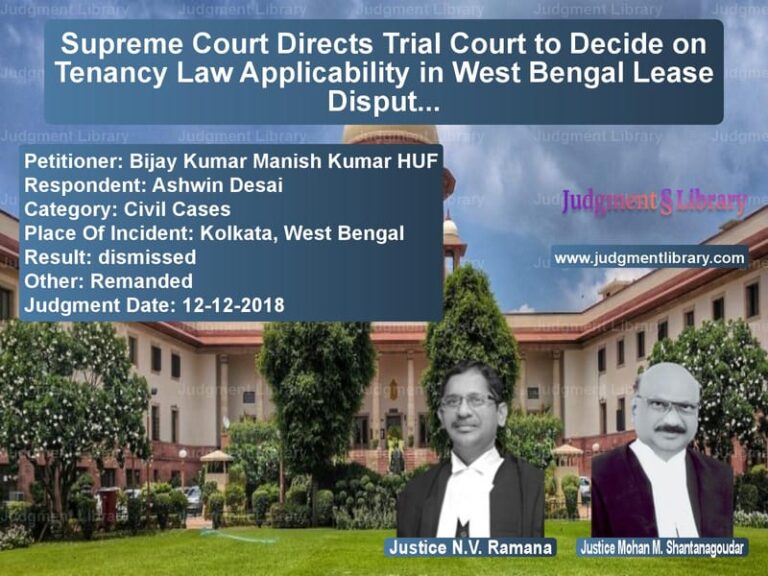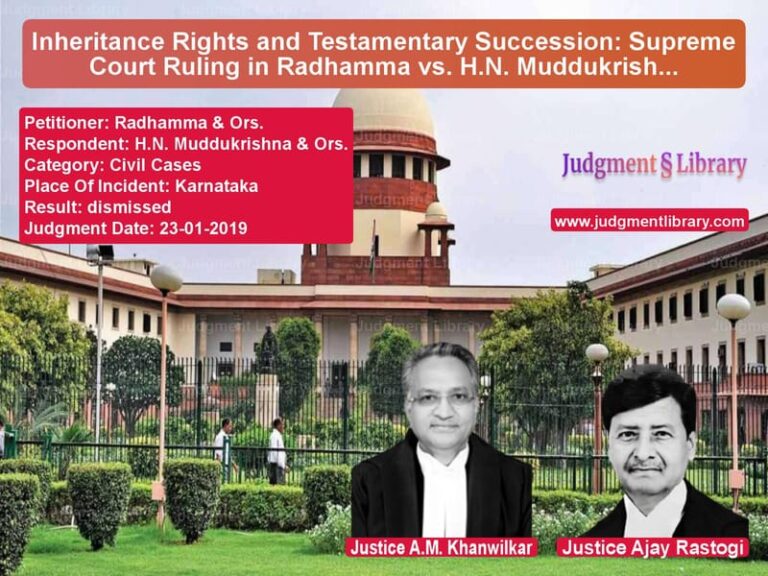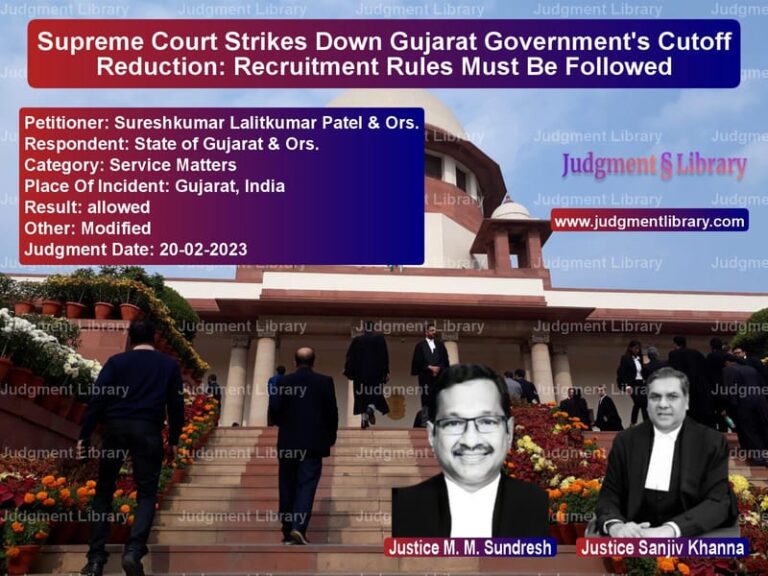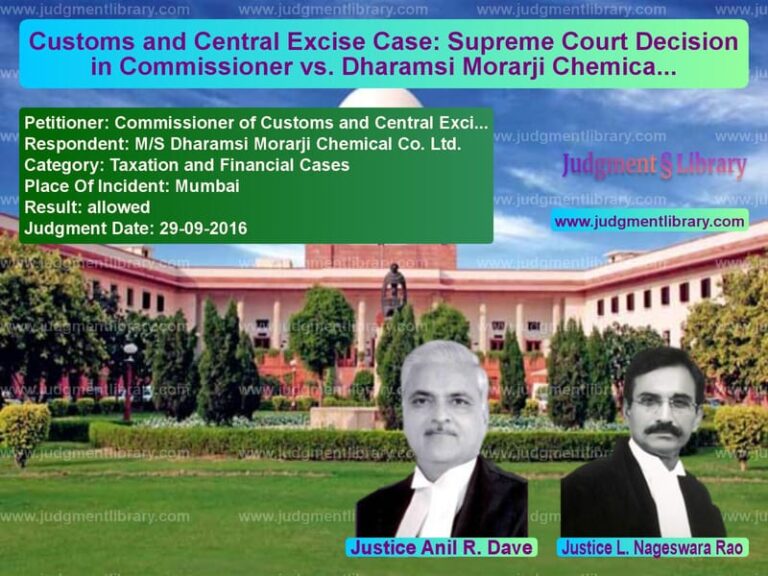Acquittal in Double Murder Case: Supreme Court Overturns Conviction on Lack of Evidence
The Supreme Court of India recently overturned the conviction of Siba Nial @ Trilochan, accused of murdering Dhaneswar Kata and his wife, Nirupama Kata, due to inconsistencies in the prosecution’s case. The ruling has brought significant attention to the necessity of concrete evidence in criminal convictions.
The case revolved around an incident from the night of May 31, 2013, when the couple was found dead on the terrace of their house in Nuapada, Odisha, with gunshot wounds. The trial court found the appellant guilty under Sections 302 (murder) and 109 (abetment) of the Indian Penal Code (IPC), and the High Court upheld the conviction. However, the Supreme Court noted glaring deficiencies in the prosecution’s case and ruled in favor of the appellant.
Background of the Case
The prosecution’s case was primarily based on the FIR (No. 72/2013) filed on June 1, 2013. The FIR did not name any specific suspect and relied on the general allegations that an unknown assailant shot the victims while they were sleeping. Several witnesses, including family members who were present at the scene, failed to identify the accused as the perpetrator.
Key Prosecution Witnesses
The prosecution relied on the testimonies of neighbors Manoranjan Behera (PW-5) and Krutibash Chhatria (PW-7), who claimed to have seen the accused near the scene on a motorcycle. They testified that they heard gunshots shortly after the co-accused, Prabhulal, went up to the terrace, and then saw both accused flee on the motorcycle.
Issues Raised by the Supreme Court
The Supreme Court raised several concerns regarding the reliability of the prosecution’s evidence:
- Neither PW-5 nor PW-7 reported what they saw for nearly nine days, despite the severity of the crime.
- The FIR did not name any suspect, and family members did not identify the accused as perpetrators.
- The ballistic report could not establish a direct link between the bullets recovered from the victims and the weapon allegedly recovered from the accused.
- The prosecution failed to explain why no gunshots were heard by others present on the terrace.
Arguments by the Appellant
In his defense, the appellant argued that the evidence against him was circumstantial and unreliable. His counsel stated:
“The prosecution has failed to establish a direct connection between the accused and the crime. The entire case is based on assumptions and conjecture, rather than hard evidence.”
The defense pointed out that the ballistic report did not conclusively match the recovered bullets with the alleged firearm.
State’s Arguments
The State argued that the circumstantial evidence and witness testimonies pointed toward the guilt of the accused. The prosecution contended:
“The accused was seen near the crime scene, and soon after the gunshots, he fled. This conduct raises a strong presumption of guilt.”
The State further asserted that the motive was rooted in a longstanding property dispute between the victim and the co-accused, Prabhulal.
Supreme Court’s Observations
The Supreme Court, after analyzing the case, found substantial gaps in the prosecution’s evidence. The judgment emphasized:
“The prosecution’s case is riddled with inconsistencies. The delay in naming the accused, the failure to establish the source of the gunshots, and the inconclusive ballistic report create significant doubt regarding the guilt of the appellant.”
It further noted that conviction in a criminal trial requires proof beyond a reasonable doubt, which was lacking in this case.
Final Verdict
The Supreme Court overturned the conviction and acquitted the appellant, stating:
“In view of the deficiencies and discrepancies in the prosecution’s case, the guilt of the appellant does not stand proven beyond a reasonable doubt. The impugned judgment is set aside.”
The Court ordered the immediate release of the appellant unless he was required in any other case.
Conclusion
This ruling underscores the fundamental principle of criminal law: an accused is innocent until proven guilty beyond a reasonable doubt. The Supreme Court’s intervention highlights the need for a rigorous standard of proof in criminal cases, ensuring that no individual is wrongfully convicted based on circumstantial evidence alone.
Petitioner Name: Siba Nial @ Trilochan.Respondent Name: State of Odisha.Judgment By: Justice Sanjiv Khanna, Justice Sanjay Kumar.Place Of Incident: Nuapada, Odisha.Judgment Date: 11-02-2025.
Don’t miss out on the full details! Download the complete judgment in PDF format below and gain valuable insights instantly!
Download Judgment: siba-nial-@-trilocha-vs-state-of-odisha-supreme-court-of-india-judgment-dated-11-02-2025.pdf
Directly Download Judgment: Directly download this Judgment
See all petitions in Murder Cases
See all petitions in Bail and Anticipatory Bail
See all petitions in Judgment by Sanjiv Khanna
See all petitions in Judgment by Sanjay Kumar
See all petitions in allowed
See all petitions in Quashed
See all petitions in supreme court of India judgments February 2025
See all petitions in 2025 judgments
See all posts in Criminal Cases Category
See all allowed petitions in Criminal Cases Category
See all Dismissed petitions in Criminal Cases Category
See all partially allowed petitions in Criminal Cases Category







